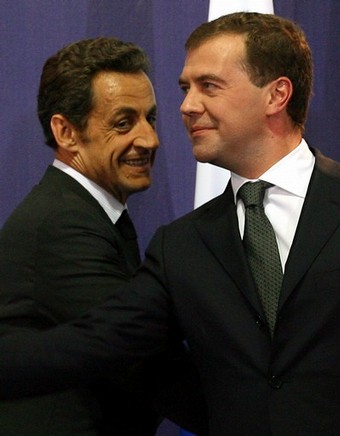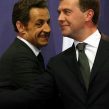
Medvedev Sorted Out the EU but Got Lost at the G-20
Publication: Eurasia Daily Monitor Volume: 5 Issue: 220
By:

Russian President Dmitry Medvedev had been looking forward to last weekend, expecting nothing but joy from the back-to-back summits with the EU in Nice and the G-20 in Washington. The predictable decision of the European Commission to reopen negotiations with Russia on a new Partnership and Cooperation Agreement (PCA) all but guaranteed a cheerful meeting with Medvedev’s new best friend, French President Nicolas Sarkozy. As for the first summit ever in the G-20 format, Medvedev had apparently expected that U.S. President George W. Bush and European leaders, humbled by the devastating financial crisis and the officially announced recession, would listen to the recommendations from Russia, China, and other “responsible” partners (Rossiiskaya gazeta, Nezavisimaya gazeta, November 14). The atmosphere in Washington was, in fact, rather different; but it is perhaps the depth of mistrust in relations with the EU that Moscow should really be worried about.
Sarkozy was all smiles and radiated confidence that he could talk his way out of any problem in relations with Russia (Kommersant, November 15). He passionately insisted that his famous “six-point plan” was the best possible end to the war in the Caucasus, and Medvedev generously acknowledged his role; but no amount of elegantly spun arguments could convince experienced Javier Solana, the EU High Representative for the Common Foreign and Security Policy, or Benita Ferrero-Waldner, the EU Commissioner for External Relations, that the plan had been implemented in full (Nezavisimaya gazeta, November 14).
Italian Prime Minister Silvio Berlusconi, visiting Moscow a week ago, found it distracting from lucrative business contracts to touch on Caucasian issues, so the EU politicians saw the need to re-open the talks with Russia in order to create a common framework for many bilateral discussions cultivated by the Kremlin (Gazeta, RBC Daily, November 7). That does not mean, however, smooth sailing for the new PCA; since the old model of partnership, based on the assumption that Russia was transforming itself into a modern democratic state, could not be maintained since Putin’s Russia is definitely evolving in a very different direction. No alternative model of cooperation without partnership, however, emerged from the chain of bitter quarrels (www.gazeta.ru, November 13).
The Europeans were disturbed by the progressive militarization of Russia’s foreign policy, further strengthened by Medvedev’s grandly presented, and cautiously disavowed, plan to deploy Iskander missiles in the Kaliningrad enclave. Most of the recurrent “saber- rattling” is illusory and camouflages a real degradation of military capabilities. Moreover, the Iskander is an as yet untested pilot project. The psychological need to build such an image, however, reveals much about the Russian leadership’s suppressed insecurity (Novaya gazeta, November 10). Seeking to alleviate these insecurities, the Europeans might agree to hold an OSCE summit next year, even if Medvedev’s fixation on a new Kellogg-Briand pact makes pitifully little sense.
What should have provided more psychological comfort are the greatly expanded economic ties between Russia and Europe; and Medvedev, speaking at the forum of entrepreneurs in Cannes, noted a 26 percent growth in trade in the first half of the year and suggested that the crisis would open up new opportunities in this area. Russia’s responses to the crisis, however, have been centered on strengthening state regulation and control over key economic sectors and have essentially neglected the task of improving the investment climate (Vedomosti, November 10). It is characteristic that in his recent address to the Russian parliament, Medvedev paid much attention to basic values and to condemning the “cult of state” but failed to mention property rights, which in Russia are legally practically unprotected (Expert, November 10).
The sudden arrival of the crisis and the catastrophic meltdown of the stock market, which lost another 20 percent last week, could have worked as “shock therapy” on the Russian economy distorted by the vast inflow of oil and gas revenues. Instead, it has strengthened mistrust in the market and reliance on the “hands-on management” style that was typical for Putin’s presidency and now dominates his government (Nezavisimaya gazeta, November 14). It is with these bureaucratic dirigisme ideas enriched with barely hidden glee about America’s decline that Medvedev came to Washington; but he was quite taken aback with President Bush’s opening remarks, which emphasized protecting market capitalism against state regulation (www.newsru.com, November 15).
Medvedev’s favorite topic, the proven inadequacy of global financial “architecture,” was not quite in sync with the firm intention of other leaders to modernize and strengthen the existing financial system, particularly by oversight and transparency measures that are not compatible with the Russian way of doing business. His bold proposal to make the ruble a global currency aroused little interest, as the U.S. dollar is strengthening its role and the ruble is not doing at all well with the financial realities at home (Vedomosti, November 13). What was particularly surprising for Medvedev was China’s readiness to contribute to the recovery of the U.S. economy (www.gazeta.ru, November 14). After all the pompous talk about “multi-polarity,” the geopolitically-minded politicians in Moscow are beginning to discover that China understands this concept as the acquisition of the economic weight and a political profile equal to that of the U.S., while Russia would be left somewhere in the periphery of that pivotal relationship.
Some of Medvedev’s misperceptions can be explained by the tiny scale and hermetic character of the decision-making mechanism, which has not expanded at all with the reconfiguration of leadership into the Medvedev-Putin “tandem.” More fundamentally, however, the inflated ideas about Russia’s ability to influence the global economy originate both in the self-serving nature of the undemocratic and unaccountable system of power based on extracting the resource rent and in an inability to adapt to its sharp contraction. In this sheltered reality, the key question is how to orchestrate Putin’s return to the presidential “throne” for the newly-extended six-year term. The shrewd courtiers in Moscow are simply unable to comprehend how entirely irrelevant this question is, since time is running very fast against their quasi-authoritarian petro-state.




